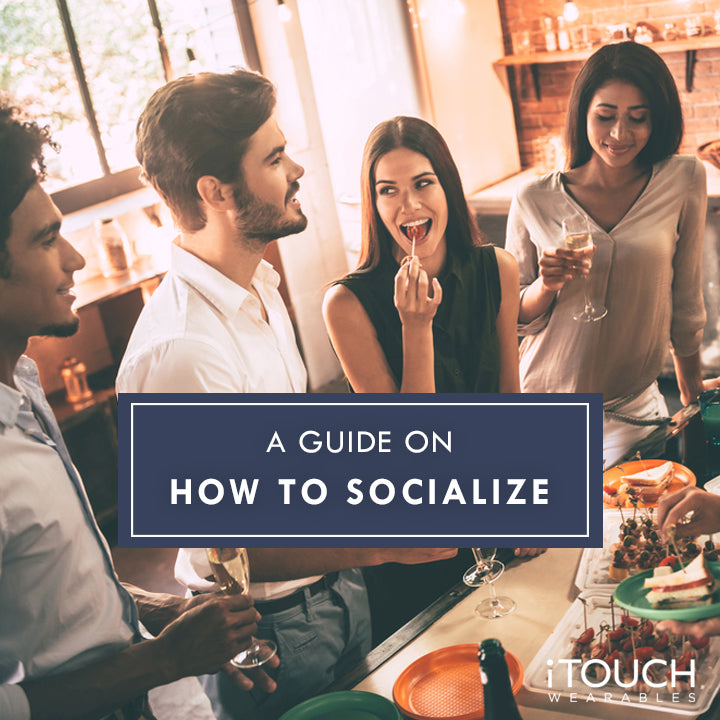
A Guide On How To Socialize
Once upon a miraculous time, there was once a little event known as the social gathering. In the 1960s, dinner parties your parent's busily attended were filled with martini-sipping colleagues and fancy dishes we never dared to think to eat like Chicken a La King or salads encased in gelatin. Ladies gossiped in the corner over croûte, dressed in the latest fashions, while their husbands mingled in the corner about the advertising firm and the clients they wooed on the golf-course.
The very act of socializing became a serious feat. It may have seemed that these dinner parties and special social gatherings were a place for grown-ups or men to boast about their so-called "happy lives" and "happy wives", but there are many benefits that come from socializing that these people never considered. Many studies have consistently shown that a social connection contributes to a happier, healthier and more motivated well-being. While social gatherings in the West now consist of the happy hours at the bar, "minglings" over coffee, or even the quick "text-in" check-up, there is an art that comes to socializing.
Nowadays, the very idea of socializing seems to be something that is not readily taught. With the focus of most teachings becoming more and more attached to subjects such as "math" and "science", social skills are more learned and adapted through daily interaction. As a child, you learn how to manage conflicts by either making friends or navigating through groups. Though, while this is important, everyone learns at their one rate and on their own way. Not everyone learns the same lessons that we adapted through this navigation in the same way. Sometimes, they take a whole lifetime to refine, and many of us never master them.
When it comes to socializing, there are also many factors that can contribute to how one may handle social interaction. Learning social skills and how to navigate through social interactions can be difficult if you weren’t exposed to more traditional group dynamics as a child. If you struggle with a mental illness like anxiety or depression, or even if you just didn’t have a lot of positive role models when you were growing up can also contribute to how you handle social gatherings. Young people tend to learn how to manage their own emotions, recognize those of other people and manage them both effectively by socializing. If you feel as if these weren’t skills you developed growing up, don’t worry! You’re not alone. This little guide on how to socialize is here to help:
Building The Foundation - Emotional Intelligence

Before we dive in on how to handle specific social situations, we need to first discuss the concept behind emotional intelligence (or E.I.). Put very simply, E.I. is your ability to acknowledge your own emotions, recognize emotions in others and use that information to guide your behavior. Being a relatively new area of study in the field of psychology, developing your own E.I. can help you understand and improve your social interactions.
There are several different approaches when modeling exactly what emotional intelligence is, but in this particular case, it is interesting to view author Daniel Goleman's stance on the subject. He outlines five general categories of E.I. that complement and support one another.
-
Self-awareness: This is the step where the ability to recognize an emotion as it’s happening to us is key. Goleman argues that we have tuned ourselves to evaluate what we feel and how to manage it. There are two elements to self-awareness: Self-confidence and Emotional Awareness
-
Self-regulation: Within this next step, we might think we have little control over what we feel, however, negative emotions can be suppressed by different self-regulating techniques, such as walking or meditation. To self-regulate properly you need self-control, trustworthiness, and adaptability.
-
Motivation: This step focuses on how we need to establish a clear set of goals. Positive thinking is key, so it’s important to put into practice being more positive, by re-framing negative thoughts. You can do this by adapting to a positive well-being, making a commitment, and finding your drive.
-
Empathy: It’s just as important to be aware of the emotions of others. This might mean developing the skills to recognize how people are expressing themselves, whether positively or negatively. It is also important to understand how other people may respond to the certain circumstances they’re in and how they readily adapt.
-
Socialization: This area deals with your ability to steer your relationships and navigate social situations. It focuses on understanding how to get where you want to be with other people. That might mean conveying your ideas to co-workers, managing a team, or dealing with a conflict in a relationship.
Every social situation is different. This means that there isn’t always a “correct” way to handle any of them and your approach may be wrong at times. This is okay, but, when viewed through the lens of these ideas from Goleman in mind, most social situations become a lot more manageable and easier to handle.
Tips For Navigating Through Social Interactions

Let's start from the beginning:
If you're introvert, it can feel mighty tempting to decline every invitation from here on out. And of course you can do this, forever and ever. But it's not always healthy to be reclusive, and eventually, social interaction is going to be needed - especially if you're only giving in to anxiety. Being reclusive can actually make your social anxiety worse. In helping you ease your anxiety, it might actually be helpful to approach it with exposure, meaning that one simply needs to do what is uncomfortable over and over again until the nervousness mitigates. It seems like a strange approach, but the more you do it, the more you become comfortable to those situations. Go to the meet-up even if you are anxious, accept the next invite, and repeat. You never know how it will come out and who knows, you may enjoy it!
Once you get used to this sort of exposure, try out these tips:
- Practice Conversation Starters - Before you attend any event or any gathering, it may be best to tuck some conversation starters in the back part of your brain. Think topical news, the book you're reading — anything you can chat about easily. Being ready with these conversation starters makes navigating the social interactions easier, while also providing some insight on the interests of the other person.
- Give Yourself Social Interaction Goals - It may sound cheesy, but giving yourself some goals for the evening can help you stride off with purpose. Are you going out to network or mingle in hopes to find your next date? Set a socialization quota to help navigate each situation!
- Paraphrase A Conversation - If you have social anxiety or feel as if you cannot concentrate, you may find yourself sometimes blanking while you talk. But don't let it freak you out. Try paraphrasing the story or taking some little bits out while you regain your memory or concentration. It can certainly help you get back on track.
- Try Going Out with A Friend - Find an understanding friend and let them lead the way into groups of people. Have your friend start conversations with someone you don't know, then offer your input as they discuss. You can find yourself being able to navigate into conversations a lot easier.
- Take Time To Recharge - As an introvert or someone who may not always deal with social interactions, it is okay to take breaks and take some time to recharge. Give yourself some space where you can be by yourself and take a moment to appreciate what you have done so far!
In the end, take time to be honest about yourself and who you are. There are numerous people out there who are dealing with the same feeling you are - myself included! But if you find yourself trying to navigate into social interactions, do not be afraid to be yourself, have fun, and ask questions - you’ll find yourself to be the life of the dinner party soon enough!
Share with us your tips on how to socialize by following us on Instagram @itouchwearables and Facebook @itouchwearables and by dropping a comment and like. Also, be sure to check out our new articles published daily!
-Patrick


